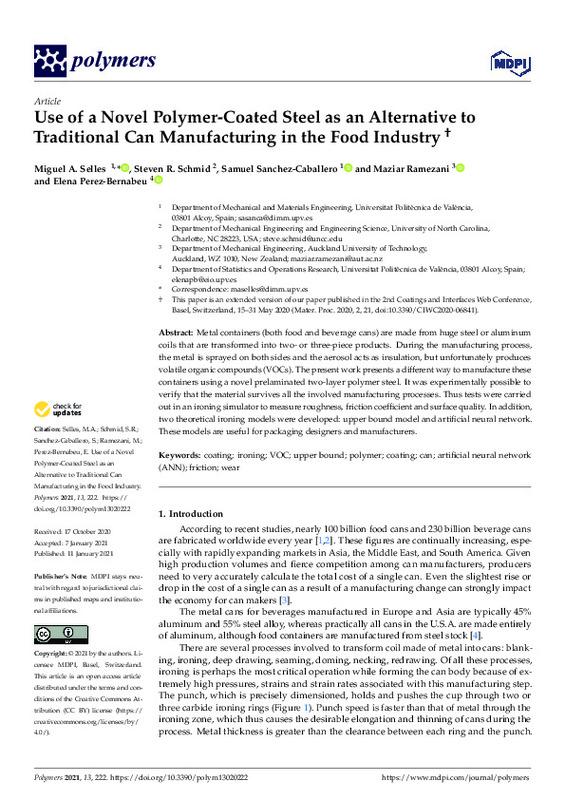JavaScript is disabled for your browser. Some features of this site may not work without it.
Buscar en RiuNet
Listar
Mi cuenta
Estadísticas
Ayuda RiuNet
Admin. UPV
Use of a Novel Polymer-Coated Steel as an Alternative to Traditional Can Manufacturing in the Food Industry
Mostrar el registro sencillo del ítem
Ficheros en el ítem
| dc.contributor.author | Sellés, M.A.
|
es_ES |
| dc.contributor.author | Schmid, Steven R.
|
es_ES |
| dc.contributor.author | Sanchez-Caballero, Samuel
|
es_ES |
| dc.contributor.author | Ramezani, Maziar
|
es_ES |
| dc.contributor.author | Pérez Bernabeu, Elena
|
es_ES |
| dc.date.accessioned | 2022-05-02T18:05:14Z | |
| dc.date.available | 2022-05-02T18:05:14Z | |
| dc.date.issued | 2021-01 | es_ES |
| dc.identifier.uri | http://hdl.handle.net/10251/182358 | |
| dc.description.abstract | [EN] Metal containers (both food and beverage cans) are made from huge steel or aluminum coils that are transformed into two- or three-piece products. During the manufacturing process, the metal is sprayed on both sides and the aerosol acts as insulation, but unfortunately produces volatile organic compounds (VOCs). The present work presents a different way to manufacture these containers using a novel prelaminated two-layer polymer steel. It was experimentally possible to verify that the material survives all the involved manufacturing processes. Thus tests were carried out in an ironing simulator to measure roughness, friction coefficient and surface quality. In addition, two theoretical ironing models were developed: upper bound model and artificial neural network. These models are useful for packaging designers and manufacturers. | es_ES |
| dc.language | Inglés | es_ES |
| dc.publisher | MDPI AG | es_ES |
| dc.relation.ispartof | Polymers | es_ES |
| dc.rights | Reconocimiento (by) | es_ES |
| dc.subject | Coating | es_ES |
| dc.subject | Ironing | es_ES |
| dc.subject | VOC | es_ES |
| dc.subject | Upper bound | es_ES |
| dc.subject | Polymer | es_ES |
| dc.subject | Can | es_ES |
| dc.subject | Artificial neural network (ANN) | es_ES |
| dc.subject | Friction | es_ES |
| dc.subject | Wear | es_ES |
| dc.subject.classification | INGENIERIA MECANICA | es_ES |
| dc.subject.classification | ESTADISTICA E INVESTIGACION OPERATIVA | es_ES |
| dc.subject.classification | INGENIERIA DE LOS PROCESOS DE FABRICACION | es_ES |
| dc.title | Use of a Novel Polymer-Coated Steel as an Alternative to Traditional Can Manufacturing in the Food Industry | es_ES |
| dc.type | Artículo | es_ES |
| dc.identifier.doi | 10.3390/polym13020222 | es_ES |
| dc.rights.accessRights | Abierto | es_ES |
| dc.contributor.affiliation | Universitat Politècnica de València. Departamento de Estadística e Investigación Operativa Aplicadas y Calidad - Departament d'Estadística i Investigació Operativa Aplicades i Qualitat | es_ES |
| dc.contributor.affiliation | Universitat Politècnica de València. Departamento de Ingeniería Mecánica y de Materiales - Departament d'Enginyeria Mecànica i de Materials | es_ES |
| dc.description.bibliographicCitation | Sellés, M.; Schmid, SR.; Sanchez-Caballero, S.; Ramezani, M.; Pérez Bernabeu, E. (2021). Use of a Novel Polymer-Coated Steel as an Alternative to Traditional Can Manufacturing in the Food Industry. Polymers. 13(2):1-15. https://doi.org/10.3390/polym13020222 | es_ES |
| dc.description.accrualMethod | S | es_ES |
| dc.relation.publisherversion | https://doi.org/10.3390/polym13020222 | es_ES |
| dc.description.upvformatpinicio | 1 | es_ES |
| dc.description.upvformatpfin | 15 | es_ES |
| dc.type.version | info:eu-repo/semantics/publishedVersion | es_ES |
| dc.description.volume | 13 | es_ES |
| dc.description.issue | 2 | es_ES |
| dc.identifier.eissn | 2073-4360 | es_ES |
| dc.identifier.pmid | 33440624 | es_ES |
| dc.identifier.pmcid | PMC7830334 | es_ES |
| dc.relation.pasarela | S\442777 | es_ES |
| upv.costeAPC | 1345 | es_ES |








